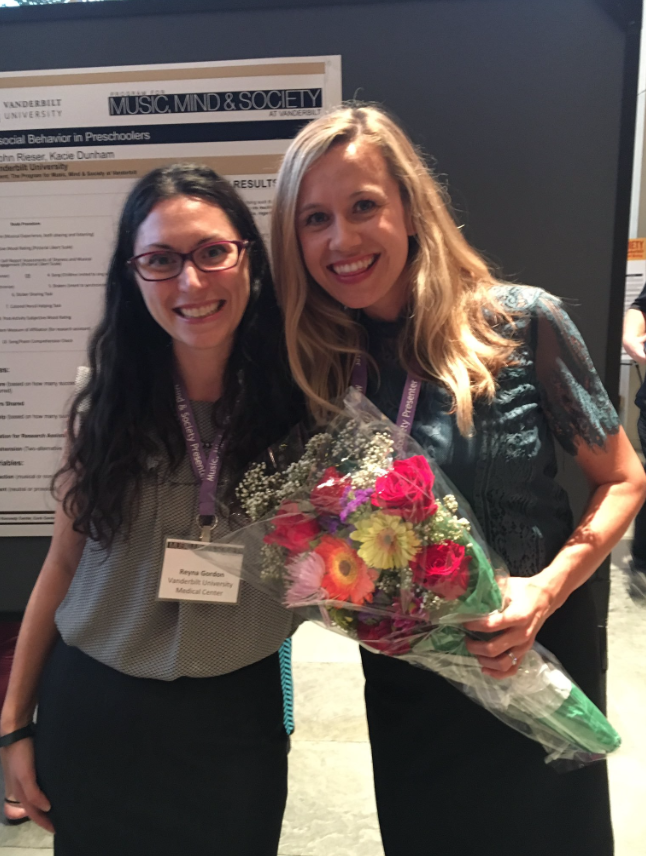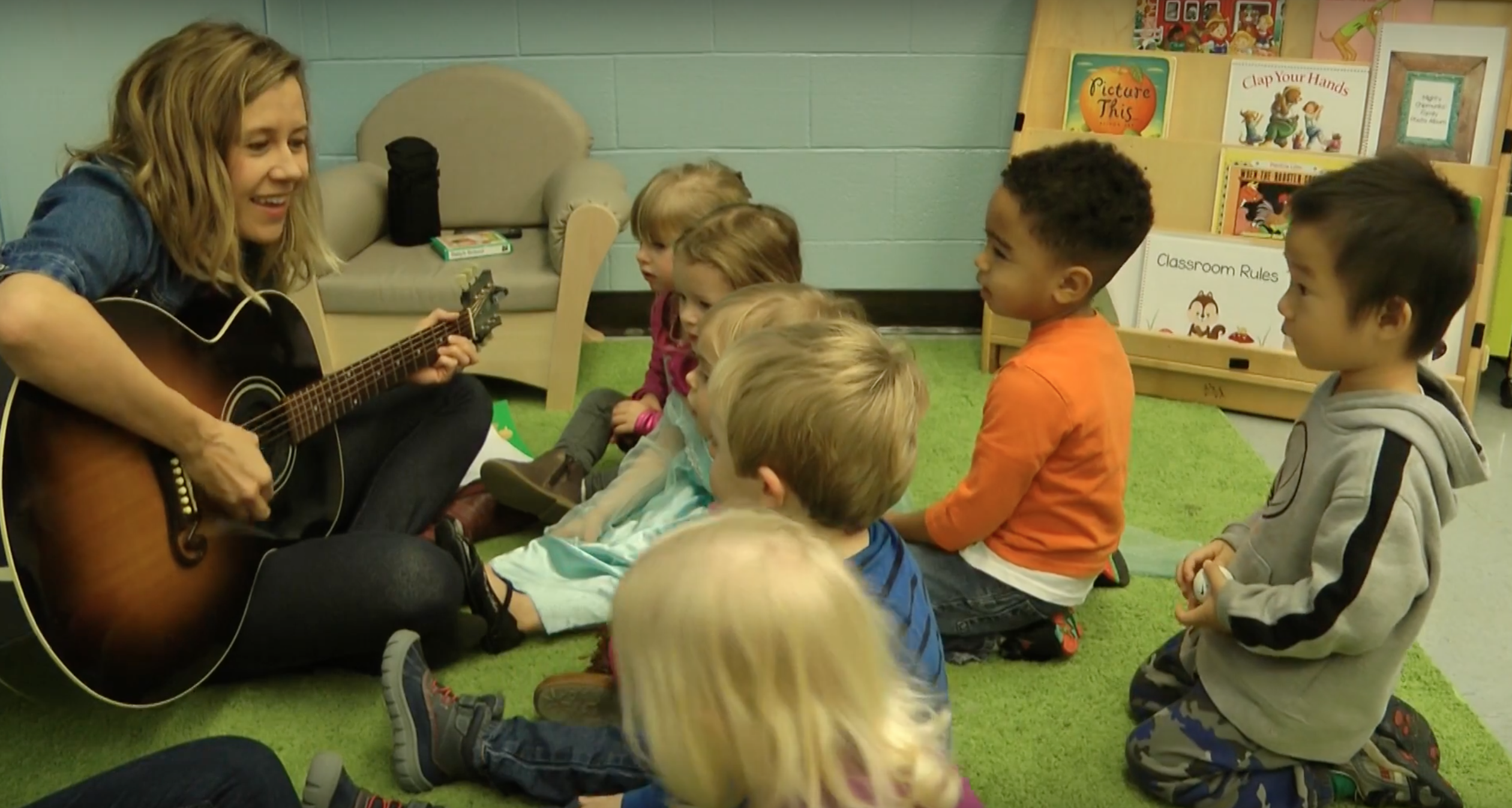Home » News » Program for Music, Mind and Society brings together researchers to examine how and why music affects us
Program for Music, Mind and Society brings together researchers to examine how and why music affects us
Posted by anderc8 on Friday, January 6, 2017 in News, TIPs 2015.

Sara Beck (right) and Dr. Reyna Gordon at the 2016 MMS Science of Song Symposium.
PhD Candidate Examines Link Between Music Making and Kindness
Written by Sara L. Beck, PhD Candidate in Psychological Sciences and Graduate Assistant to the Program for Music, Mind, & Society
Have you ever felt a shiver singing along with a group of people – around a campfire, in a place of worship, or even in a sweaty crowd at a club? I definitely have; I remember drifting off to asleep singing “Love Is a Rose” with my mom sitting on my bedside when I was in elementary school, singing along at the top of my lungs to Violent Femmes with my big sister at the wheel on weekday mornings in high school, and learning to play Neil Young songs on guitar with my dad on Saturday mornings. There was something about having those experiences early on that spoke to me; I began seeking out opportunities to make music with other people from the time I was six or seven years old, and I still seek out those opportunities today. As a beginning doctoral student in 2013, I was intrigued by recent research demonstrating that the magic of group singing and music making goes even further; making music together actually has a whole range of measurable “feel-good” effects like making us more likely to help one another, behave generously toward one another, and feel a sense of connectedness and similarity. What a thrilling corner of scientific inquiry – seeking to understand the seemingly magical role that music plays in the human experience. The TIPS-funded Program for Music, Mind, and Society at Vanderbilt (MMS) has made tremendous progress in this field since its inception less than two years ago. My research on music making and prosocial behavior is just a small cog in the wheel of music and brain research that is starting to roll here at Vanderbilt in the heart of Music City. MMS is all about bringing together researchers from diverse disciplines to examine how and why music affects us, and learning how we can harness this knowledge in service of health, wellness, and education.
As a graduate assistant for MMS and The Music Cognition Lab, led by Dr. Reyna Gordon (also associate director of MMS), I have had the opportunity to network with the growing community of researchers interested in music and mind at Vanderbilt, and it’s a diverse and impressive group. Dr. Blythe Corbett looks at how immersive music and theatre experience affects social and communicative skills in children with autism. Dr. Gordon’s work examines links between musical rhythm and grammar, including applications for children with language disorders. A recent paper from Dr. Aysu Erdemir and Dr. John Rieser looked at how vocal and instrumental training affects singers’ ability to rely on kinesthetic feedback when singing. Dr. Sohee Park investigates the capacity for music to inhibit auditory hallucinations and improve cognitive function in people living with schizophrenia. This small sample of MMS researchers represents student and faculty involvement from The Vanderbilt Bill Wilkerson Center, The Vanderbilt Kennedy Center, and The Treatment and Research Institute for Autism Spectrum Disorders, as well as the Department of Otolaryngology, Peabody, and the Department of Psychology in Arts & Sciences. To date, thirteen Vanderbilt departments and nine centers and institutes are involved with MMS. The Program for Music, Mind, & Society at Vanderbilt is growing, and with it, the potential for music to play an even more meaningful role in peoples’ lives through healthcare, education, and community initiatives becomes more of a reality.

Sara Beck plays music for preschoolers in a research-like setting
As for me, I am exploring what it is about music making in preschool-age children that contributes to positive behaviors like helping and sharing. I’m interested in lyrics; does it matter if the songs we sing with children have didactic themes, or is it simply the act of singing together that matters? How about the beat? How important is temporal regularity in facilitating positive behavioral effects in children? Earlier this year, I attended a community workshop on building a vocal community led by Dr. Ysaye Barnwell, a composer and longtime member of multi-Grammy winning group Sweet Honey in the Rock. She talked about how repetition helps us embody and own information, and how music gives us a unique framework for repetition. She explained that when we sing in the oral tradition – without sheet music – we imitate not just one another’s sounds, but attitudes and posture as well. Dr. Barnwell’s ideas parallel those being explored in the world of music cognition research, in which interest in the benefits of group singing for both children and adults is surging.
One of the books I have carried around since my summer camp days is called Rise Up Singing: The Group Singing Songbook. It has lyrics and chords for 1200 songs, from spirituals to folk tunes to children’s songs – some of my favorites are “I’ll Fly Away,” “Will You Still Love Me Tomorrow,” and “The Water is Wide.” In the introduction, folk-singer and activist Pete Seeger writes, “you’d be surprised how much better a song sounds when several voices join in together.” My thoughts exactly.
Related videos
A boisterous New Year’s Eve crowd sings along with Sara’s acoustic cover of Michael Jackson’s “Billie Jean”
With the support of the Curb Center for Art, Enterprise, & Public Policy’s Public Scholar Program, Sara and fellow Peabody PhD student Colleen Russo Johnson created an original album of prosocial children’s songs made freely available within the community (free album download here).
Hear Sara talk about her research:
